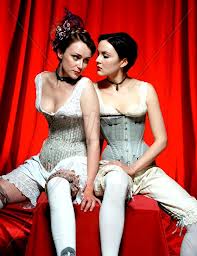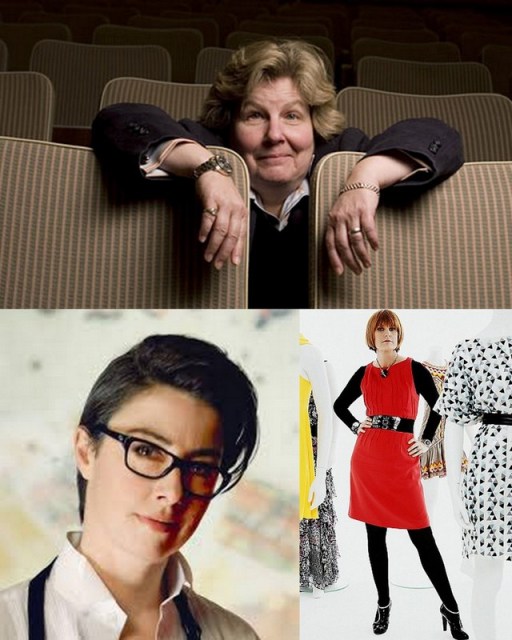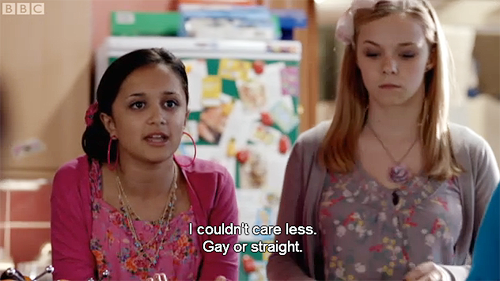feature image via Diva Mag
Thanks to the BBC’s axing of lesbian drama series Lip Service in mid-January, we are left looking forward to two new BBC Three dramas, Being Human and In The Flesh; shows about an interspecies, supernatural flatshare and the rehabilitation of treated zombies have replaced everyone’s favourite emotionally unstable Glaswegian ladies. As Diva magazine pointed out last month, monsters don’t pay license fees or sign petitions making this a particularly frustrating prioritisation of the apparently sexier but heterosexual undead.
Whereas our only way to stop Lesbian Vampire Killers is not to watch them or write angry reviews on Amazon, the BBC has a bit more responsibility when it comes to LGBT drama; it is publicly held accountable for its programming, both by the reports it commissions and by external campaigning bodies like Stonewall. Since everyone who has a TV in the UK pays to fund the BBC – whether they watch its programmes or not – it has a recognised obligation to lead the way in reflecting the country’s makeup fairly. People also have a strong investment in — and campaign for the improvement of — its representations of disabled people and ethnic minorities.
 In November, the BBC commissioned an update of their 2010 report on LGB representation that calls for real change, consulting nine experts and campaigning bodies. With no petticoat-rustling lesbian historical dramas like Tipping the Velvet or Fingersmith up the BBC’s sleeves this year – let alone a sex-accented new series – this report is a refreshing recognition of how the BBC could do better. Disappointingly, the BBC have followed Stonewall, who reported on LGB representation in 2006’s Tuned Out, in excluding Trans* people from the report. Though Stonewall has a pretty controversial record on Trans* issues, the BBC has failed to explain why the report is LGB, not LGBT. Encouragingly, they’ve started an open competition for writers and actors for a TV pilot with transgender themes, suggesting that at least they see a hole in their coverage, even if they’ve shied away from discussing it publicly.
In November, the BBC commissioned an update of their 2010 report on LGB representation that calls for real change, consulting nine experts and campaigning bodies. With no petticoat-rustling lesbian historical dramas like Tipping the Velvet or Fingersmith up the BBC’s sleeves this year – let alone a sex-accented new series – this report is a refreshing recognition of how the BBC could do better. Disappointingly, the BBC have followed Stonewall, who reported on LGB representation in 2006’s Tuned Out, in excluding Trans* people from the report. Though Stonewall has a pretty controversial record on Trans* issues, the BBC has failed to explain why the report is LGB, not LGBT. Encouragingly, they’ve started an open competition for writers and actors for a TV pilot with transgender themes, suggesting that at least they see a hole in their coverage, even if they’ve shied away from discussing it publicly.
While depictions of Trans* people are mostly limited to Channel 4’s reality series My Transsexual Summer, out lesbian and bisexual women present huge swathes of British TV at the moment, as the report acknowledges. Claire Balding was all over the Olympics coverage this summer, her civil partner Alice Arnold presented the BBC Radio 4 News for twenty years, Sandi Toksvig and Susan Calman joke about being ‘the lesbian team’ on QI, a comedy quiz show. Sue Perkins is ubiquitous for munching supersize and historical snacks and for taking part in panel show, and Mary Portas is on a one-woman, spike-heeled crusade to take over the British high street and fashion industry and run it properly. Although all these women have spoken openly about their personal lives and partners and a few even have masculine-of-centre presentations, they are all white middle-aged women and apart from the always-outspoken Sandi Toksvig, most of them probably don’t read as lesbian or bisexual to casual viewers.

top: Sandi Toksvig, bottom left: Sue Perkins, bottom right: Mary Portas
Where the BBC falls down is in integrating lesbian and bisexual characters and topics into drama, factual programs and especially young people’s programming. Skins (over on semi-commercial Channel 4) and Lip Service deserved their popularity, managing to be fun, sensitive and sexy without being completely unrealistic (although Frankie’s systematic de-queerification/surprise personality transplant lost this Skins fan along the way). But since they’ve left, nothing new has come along to fill the gap. Budget cuts to BBC drama provision last year aren’t exactly encouraging for the future. The report on BBC LGB coverage is measured, but fairly damning, saying that lesbians are “relatively invisible compared to the level of coverage of gay men” and that “Gay and bisexual men seem relatively happy with the TV they consume…lesbian and bisexual women perhaps less so.” Perhaps most telling, one of the study’s key findings was that “representation is still so unusual that it stands out when it is included.” None of this is news to anyone watching BBC programmes, especially their drama and factual programming. Two years after the first independent report, the main improvement is in the public appetite for, rather than the provision of, LGB characters (which, it’s notable, only 15% of the BBC’s independently-run audience reaction panel Pulse are uncomfortable with, down from 19%). Excitingly, the BBC has been asked to be “more creative and bolder…taking care to steer clear of stereotypes.” Yet after the complaints about Lip Service’s brave forays into topless sex scenes before the first episode’s opening credits, and its second series ratings drop, it might be a case of once bitten, twice shy.
Another of the BBC’s findings – that there should be more LGB representation in children’s television – is worth exploring. Doctor Who, although not really a children’s programme, is well-known for having LGB characters fitting naturally into storylines thanks largely to Russell T. Davies, who also wrote the gay drama series Queer As Folk. Steven Moffat, who’s drawn some controversy with his representations of LGBT characters in Sherlock, especially Irene Adler, is continuing that tradition. Sexy Silurian lizard lady Madame Vestra and her partner Jenny were on at tea time on Christmas Day and judging by the handful of complaints received, shocked approximately no one. Extra encouraging, though, was a well-thought-out lesbian storyline last Friday on The Dumping Ground, an after-school children’s drama about kids in care.

The Dumping Ground
The storyline may focus on a same-sex couple wanting to foster a character, but their relationship is really just a backdrop to action. They’re shown as warm and loving to each other, but the issue is whether Gus, who has Asperger’s Syndrome, can trust them, and handle the change of moving. The other childrens’ reactions are realistic but not nasty; one says that “they’re not proper parents,” and another asks, “people are already down on us because we’re in care – what will they say when they realise we’re living with lesbians?” One boy goes out of his way to criticise the couple, falling out with his sister for trying to put Gus off leaving, but is later shown to be feeling rejected after being abandoned by his parents. The childrens’ argument adds up to the idea that it is better to have a family than not, and since none of them have experienced a normal family, they can’t know whether you need a father or not – a mature conclusion that doesn’t heavy handedly say same-sex parents are better or worse, but admits that no one really knows for sure.
And that’s precisely why people shouldn’t worry about LGBT characters in children’s TV. Children will accept them and move on because they are adults, and adults are fundamentally a bit boring compared to aliens or pirates or magic sea sponges. The BBC may have axed Lip Service, and have run out of Sarah Waters books to dramatize (bar the lesbian-free Little Stranger), but they do seem to be making a commitment to representing LGB people and admitting that they could do better. Under budget pressures, specifically LGB-themed dramas look like they’ll get cut and fragmented into characters and episodes scattered across mainstream drama, reaching more people, even if they’ll touch fewer.



Good piece. I often care more about shows on BBC than on US TV, so this stuff matters to me. Losing Lip Service still hurts because it was left so unresolved. I also simply cannot comprehend how British people are okay with their TV channels taking several months to decide what shows to keep and what to ax. The four or five months of silence after Lip Service ended with no word at all added to the pain. lol
Sorry for going off topic, but anybody know what’s going on with Jennifer Beals’s L Word tweet?
I think I’m right in saying Sue Perkins has written a 6-part sit-com about a middle aged lesbian who isn’t out to her parents which is due to air sometime in the first half of this year, in a pre-watershed slot. So needless to say, I am pretty excited for that. But of course, we need more and hopefully this report will lead to that, but I don’t know how optimistic I am after Lip Service’s destruction…
It’s called “heading out” and it airs on February 26th. THAT’S TWO WEEKS PEOPLE!!
http://www.bbc.co.uk/mediacentre/proginfo/2013/09/heading-out.html
yessss i’ve been waiting for this for months. i’m a little in love with sue…
Aaaaaaaaand apparently Anna Skellern (aka Sexy Lexy from Lip Service) is also in this!
That’s all you needed to say. (swoon)
As a middle aged lesbian myself, I’d be psyched to see this.
How could I watch it?
HOW DID I NOT KNOW ABOUT THIS?! I am actually in love with Sue Perkins. And I’m not being flippant, I mean that in a very sincere and probably slightly creepy marriage and five adopted babies way. Thank you so much, I’d have completely missed this otherwise! (tragic)
EEEEEEEEEEE moar Sue Perkins.
Can’t believe that Lip Service has been axed in favour of Being Human! However, BH does have a very attractive glaswegian lady this season… silver lining?
My solace in losing Lip Service is that I have a soft spot for Being Human. And have you seen Alex, the new ghost? Her alternative lifestyle haircut is amazing, even if she isn’t that way inclined.
I also have a soft spot for Alex.
That’s what you said, right?
Lip Service wasn’t that great if you think about it. Nearly all of them were on hard drugs and extremely dysfunctional/mentally ill. Terrible representation .People only miss it because that’s all there was.
Nope. I really liked it personally.
People on hard drugs:
Frankie
Sadie
Jay (straight guy)
that intern jay has a crush on (straight girl)
People not on hard drugs:
Cat
Sam
Tess
Lou
Lexy
Fin
Everyone else.
Most people on TV are dysfunctional, I don’t think any of the characters were really mentally ill.
You definitely have a point about it being all there was – it was far from a perfect TV show – but I don’t think hard drugs/mental illness were the main issues.
For the record, Tess refuses because she has an audition the next day, and Lexy snorts coke (i think?) with everyone else in the bathroom. Sam does while grieving, too, of course.
Yeah ok, it’s been a while since I watched it, maybe my memory is deceiving me. I remember seeing an interview with the writer/director Harriet Braun where she was asked about all the depraved behaviour of drink, drugs and affairs on the show. She replied that lesbians/bisexuals have the right to be just as badly behaved as any straight person on TV and I’m inclined to agree… plenty of straight characters on Eastenders or Skins do the same thing. It’s sad that LGB people always have to be on their best behaviour. Which is precisely WHY we need more programmes so we can see ALL THE QUEERMOS and not need to be judged by any specific one.
Being Human isn’t a new show. It’s going into it’s 5th season so I don’t see how it is a replacement for Lip Service. I see it as BBC just deciding to keep one of their more successful franchises rather than Lip Service which I hear didn’t have the best of ratings. I’ll miss Tess and Lexy but I’m glad I’m not loosing BH and I love Vastra and Jenny on Doctor Who.
I was confused by that too, it also has a US remake
“Children will accept them and move on because they are adults, and adults are fundamentally a bit boring compared to aliens or pirates or magic sea sponges.”
This sentence made my day, thank you!
Didn’t ya hear? Being Human was axed a few days ago.
WHAT!?!
*flips table*
BH wasn’t axed, the creators decided to call it a day. But yeah it’s ending in a month.
I think the BBC’s representation of lesbians and bisexuals is terrible. There’s only Doctors, Casualty and Last Tango in Halifax that have regular lesbian characters in them. I can’t think of a show that has a regular bisexual one. Unless I’m forgetting something. One-off storylines in shows are nice but they only happen occassionally and that’s not good enough. Gay/bi storylines are regularly all over BBC shows.
Skins will have a lesbian storyline back in S7. Naomi/Emily will be returning for Skins Fire. It’s only two episodes but it’s good to have back probably the best ever TV lesbian storyline from the UK.
Good article.
It actually pains me more to see how Channel 4’s gay representation has gone downhill. When I was growing up, Ch4 was the place with all the edgy stuff late at night that you were petrified of your parents catching you watching: the Queer Street season, Queer as Folk, the coming out night in honour of Ellen. BBC2 did try and get a look in with the very campy Gaytime TV; it seems astonishing that we had a full-on gay magazine show fifteen whole years ago, but now? Nothing…
A lot of the mainstream channels have become so diluted as they’ve split off into different digital brands, and it feels like we’ve kind of lost our place among them. While we obviously have access to a whole world of gay programming and information on the internet now, and I appreciate how amazing that is, part of me resents the fact that the onus is on us to go out and find it – and a lot of people may not be in a position to do that.
What I’ve always loved about TV is the currency of it and the immediacy. And seeing gay programmes gives you the feeling that in some ivory broadcasting tower, some powerful people have decided that your weirdo gay needs are important enough that they’re gonna zap a show about it right now to the whole country.
It makes me sad that kids in the UK aren’t getting the chance to feel that anymore.
Thank you Autostraddle for responding to my email with this very informative and well written article! It’s high time attention be drawn to this. As an British tax payer it would be nice to see my community represented more on a network I am paying for! BH used to have (not sure if she is still in it as haven’t watched it in yonks) the amazing Lenora Crichlow who played Sugar in “Sugar Rush” which is why even though she wasn’t gay in BH she is still a gay friendly actor so I didn’t mind that programme for a while. But the BBC need to get their act together. The UK is rapidly moving forward on equal marriage (hurrah!) and the BBC need to get with the times.
I’d love to see The Doctor get a lesbian companion on Doctor Who. My favorite Doctor/Companion relationships were the ones where there was no sexual tension, just familial companionship (Donna Noble, Amy Pond post-wedding). I’d especially love it if this character were a dapper butch who shared Eleven’s belief that bow ties are cool.
So, this article is how I found out about Lip Service being cancelled. Whyyyyyyyyyyyyy